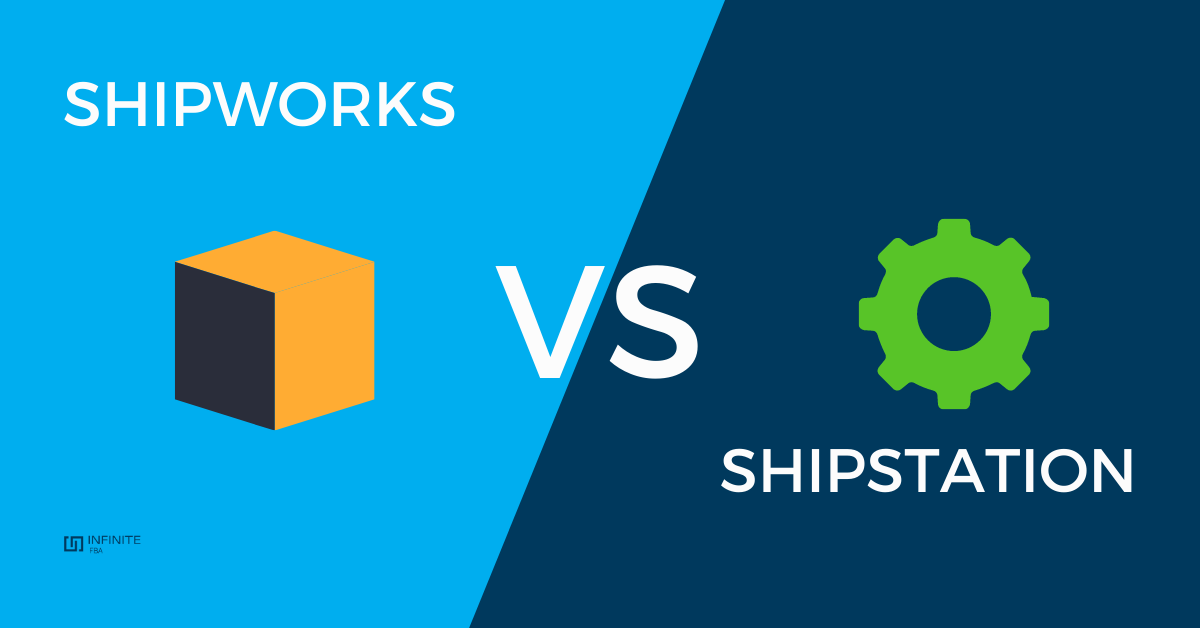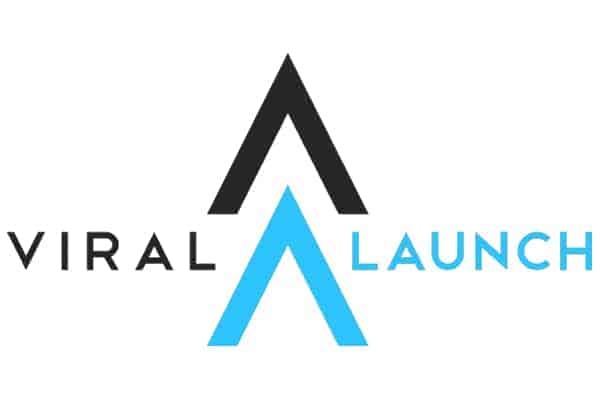Shipping can be a source of frustration for many e-commerce businesses and warehouses.
Thankfully, the industry now has software and tools that can automate nearly every process.
ShipStation and ShipWorks are two of such tools. If you are at a crossroads between these two, this guide will help you figure out which option best suits your business.
What is ShipStation?
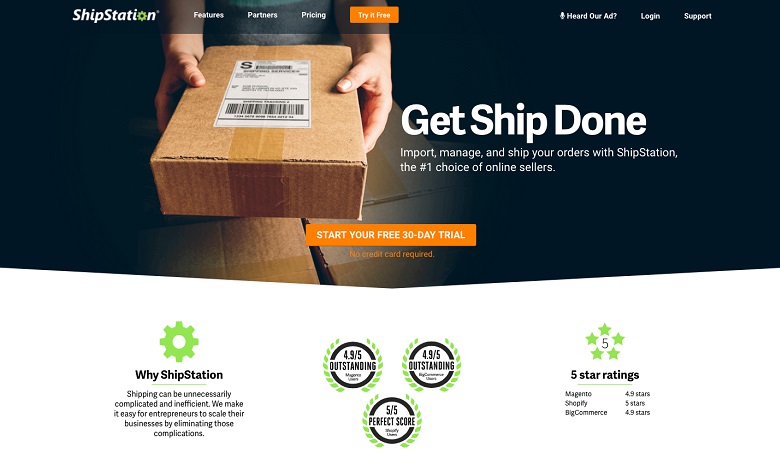
ShipStation is multi-channel, multi-carrier cloud-based shipping software designed to speed up the order fulfillment process.
The software offer impressive tools such as personalized packing slips, discounted shipping, batch shipping, and more.
ShipStation is an ideal choice for online retailers who sell on multiple platforms. It comes with an easy-to-use admin dashboard, making it pretty simple for just about anyone to use, even if it is their first time using automated shipping tools.
ShipStation Features
The following are a few of the standout services you get with ShipStation:
- Inventory management: You can easily view stock levels, allocate stock, set inventory alerts, and generally manage your inventory more efficiently whether from remote locations or your warehouse.
- Branding: Create a personalized and memorable delivery experience for your customers with customized shipping labels, tracking page, and more at no additional cost.
- Order management: Manage all your orders on multiple sales channels from one platform. Get insights into every order on different channels and save time by automatically applying actions to orders based on your criteria.
- Create discounted shipping labels: You can quickly generate discounted shipping labels, find the most competitive rates, and print labels with only a few clicks.
Pros
- Cloud-based software: Users don’t need to download and install the software. The stand-alone shipping software can be accessed from just about anywhere in the world where there’s an internet connection. This makes it easy to synchronize your database across all workstations without the hassles of updating information on individual systems.
- Affordable pricing plans: ShipStation subscription plans are incredibly inexpensive for the amazing features they provide.
- Customized labels and packing slips: With ShipStation, customers get to see your personalized labels and packing slips along with the tracking code. This gives your site a more professional and polished look.
- Robust support services: Users can get in touch with customer support through various channels, including chat, phone support, email, help desk, knowledge base, and a support forum.
- Cross-platform compatibility: In addition to being a cloud-based shipping product, the software is compatible with the major operating systems (Windows and Mac) for desktop users. It also supports mobile devices, including iPhones, iPad, and Android devices.
- Seamless third-party integration: Integration with other platforms is a cinch, including Woo Commerce, Amazon, Shopify, eBay, and more.
Cons
- Limited number of users: While the pricing is highly affordable, the plans have a very limited number of users. Even the highest plan supports only 10 users.
- Lackluster customer service: While ShipStation has plenty of channels to contact customer service, it can take a long time to get a response from the support team.
- Possible UI issues with mobile app: The mobile app might not work very well with printers and small browser screens, especially when printing labels from phones.
What is ShipWorks?
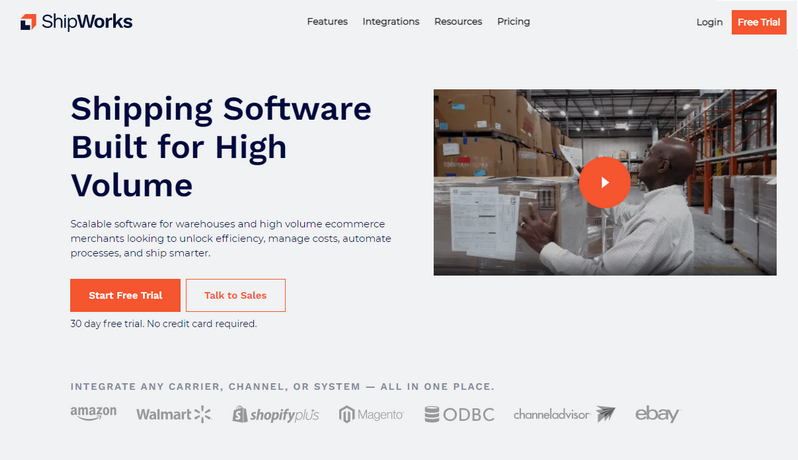
ShipWorks is an e-commerce shipping software program designed to automate order fulfillment for first-rate inventory management.
The software is best for warehouse customers working with several carrier-specific solutions. It is an excellent cost-effective way to easily achieve scalability and operational efficiency.
ShipWorks provides a unified multi-carrier solution, allowing users to quickly and accurately compare shipping methods and carrier rates.
The platform comes with tons of powerful and highly effective features that provide useful services, including advanced AI automation, plus industry-leading customer support that’s always available from setup to every single package you ship.
Pricing starts at $49 per month and has 5 different subscription plans suitable for large e-commerce stores and warehouses.
You can try the software free for 30 days to know if it works for your shipping needs before opting for a preferred subscription plan.
ShipWorks Features
With ShipWorks you get plenty of features and shipping services, a few of which include:
- Reduced cost: You get the best carrier rates on every shipment while significantly reducing human errors.
- Consolidated channels and systems: The software can easily adapt to your unique supply chain model whether you have two or ten warehouses. It connects to any marketplace or cart, thanks to the over 100 built-in integrations.
- Streamline existing operations: You don’t need to replace your existing fulfillment operations since ShipWorks offers tools that help you to build custom workflows to suit your existing processes and systems.
- White glove customer support: Users get free and unlimited personal support from a highly-knowledgeable support team right.
Pros
- Easy to set up and use: Even first-time users of these types of programs can set up and use ShipWorks quite easily. There is nothing complex about the software, so anyone can quickly understand how it works. It also features a guided onboarding setup.
- Ability to create custom templates: Users can come up with tailor-made templates that suit their specific needs. But that’s not all. Users can automate actions to send out emails to their various customers and provide them with vital order details, such as order status, tracking information and more.
- Unlimited number of users: You can add as many users as you want, regardless of the pricing plan you choose. Best of all, you are in charge and can control permission for each user you add.
- Feature-rich software: Comes with excellent features, including intelligent order routing that automatically routes orders based on product inventory, warehouse location, marketplace rules, or SKUs. Users can also get the best rate for each shipment with exclusive carrier discounts, thanks to the best rate tool.
- Great customer support: ShipWorks offers unlimited phone and email support regardless of your subscription plan. The dedicated support agents aren’t only knowledgeable, but also very attentive.
Cons
- Not cloud-based: There is always the risk of losing your data because the system is installed on your computer. Upgrading the program can be stressful, as you will have to manually upgrade on individual workstations. Also, having employees working on the same data in different locations or synchronizing data can be quite a headache since the system is not cloud-based.
- Compatibility issues: The software doesn’t work on all platforms. This limits its use to Windows (desktop and on-premise) and Linux (on-premise). Also, the software is not compatible with thermal printers.
- Expensive pricing plans: The cheapest subscription plan in ShipWorks is five times costlier than the least plan available on ShipStation.
- Glitches: While the software is generally stable, it can freeze sometimes. This glitch tends to happen when adding a shipment on another screen. Also, dealing with many updates can make the entire system slow sometimes.
- Limited support services: Users can only get in touch with ShipWorks through chat and phone support.
ShipStation vs ShipWorks: Similarities
ShipStation and ShipWorks are both shipping applications designed to make order fulfillment a hassle-free process. They minimize shipment errors and are both great products.
The following are some of the common features and services they offer.
Training
When it comes to training, both programs offer webinars and live online training sessions. This is in addition to in-depth documentation that explains how each of the services works.
However, ShipStation goes a bit further to offer in-person training as well as providing video tutorials.
Core Features
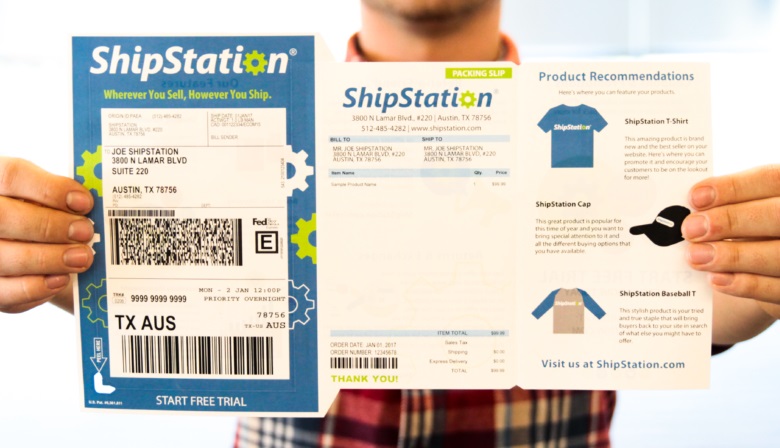
Of course, both software programs perform essentially the same function, so it is normal to see many similar features shared between them.
Some of the similar core features include:
- Ground shipping
- Parcel shipping
- Shipment price calculation
- Shipment tracking
- Warehouse management
Both packages offer a free 30-day trial period, although there are no free versions. Users get custom branding, custom automation rules, and pre-built automation rules. There are also shipping discounts with both software programs and they can both generate advanced reporting.
However, ShipWorks surpasses ShipStation with some critical services, including air shipping, freight shipping, and container shipping. It also has bills of lading and offers import/export management features.
Ease of Use
Learning how to use these shipping products is pretty straightforward, regardless of the option you go with. They are easy to set up and understand. You don’t have to worry about any steep learning curve that will keep you away from focusing on your business.
Shipping Service Integration
Both software offers robust integration with marketplaces, order management systems, carriers, payment platforms, and other e-commerce tools to help you seamlessly sync your shipping.
7 Tips when Shipping to Amazon FBA Warehouses
ShipStation vs ShipWorks: Differences
While these shipping software programs have similar functions, they differ in some aspects. Here’s a rundown of what sets them apart.
Target Users
One of the most important differences between the two shipping products is who they are designed to serve.
ShipStation is specifically designed to suit the needs of merchants who run small, medium, and large e-commerce businesses and sell on multiple channels, such as Amazon, eBay, Walmart, etc. The software is created to help retail sellers who ship physical goods to save lots of time and money.
On the other hand, ShipWorks is best suited to high-volume warehouses that use multiple carriers. The software can be customized to suit the unique needs of these businesses.
Support Services
ShipStation offers many channels for users to contact the support team. These include email/help desk, phone support, chat, and a community where you can ask questions and get responses from other users like you.
However, ShipStation’s support team can be less than satisfactory in some cases.
On the flip side, ShipWorks offers only chat and phone support. Thankfully, these services are free and unlimited to all users, regardless of their subscription plan. Also, the support service is top-notch and highly effective.
Shipping Solution

ShipStation uses third-party integrations to provide shipping solutions to businesses and warehouses. On the other hand, ShipWorks provide support for warehouse shipping directly from the platform.
Special Features
Both shipping software products come with unique features that make them distinct. Some of these include:
Branding: ShipStation offers users a custom branding tool for tracking pages and returns. This feature (or something similar) is not available with ShipWorks.
ShipSense: This internal data AI tool is only available with ShipWorks. It is incredibly effective for automating recurring orders. ShipStation does not have this feature or even something similar.
Pricing Plans
ShipStation offers six different pricing plans starting at $9 per month. Its most expensive plan – the Enterprise plan- is offered at $159 per month.
ShipWorks is available at a bit steeper price. It has five different subscriptions starting at $49 per month. The Warehouse Elite plan is the most expensive at $799 per month.
Other Shipping Comparisons:
ShipStation vs ShipWorks: Which One Is Best for You?
Reading through this ShipStation vs ShipWorks comparison, just about any e-commerce business owner can quickly figure out the most ideal shipping solution for their business.
You will be better off with ShipStation if it is your first time automating your order fulfillment and want something incredibly simple and easy with lots of third-party integration and flexibility.
Whether you have a small, medium, or large business, the software will work just fine.
On the flip side, ShipWorks will be an ideal shipping solution if you are in the market for something that offers more automation and advanced features.
The software is particularly useful for high-volume warehouses and businesses and provides dedicated and industry-leading support that can save you plenty of time and revenue.
Conclusion
Here’s one important thing to take away from this guide.
One shipping software product is not necessarily better than the other. Instead, they are designed to meet the unique needs of different businesses.
In other words, don’t pick a tool simply because it is a widely popular or cheaper option. Think about the specific features and shipping services it offers and how they can help you simplify your shipping processes before deciding whether it is the right software for your business.
Reference Articles

